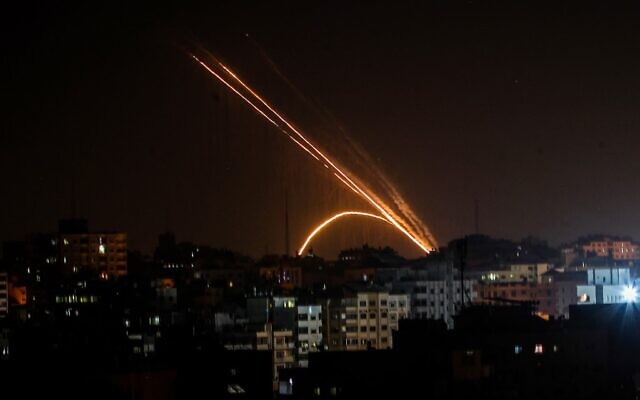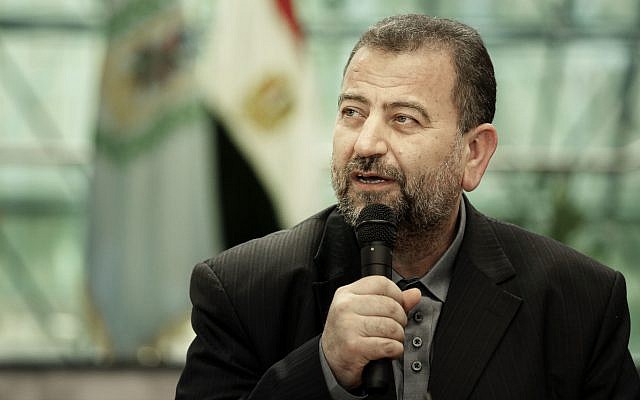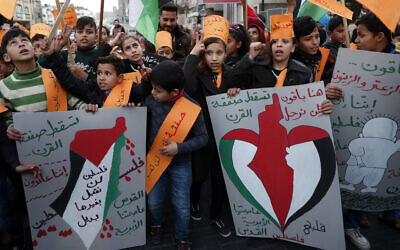IDF retaliates with strikes in southern Gaza after projectile lands in open area in Eshkol region; terror groups threaten to step up clashes along the border

Terrorists in the Gaza Strip fired a rocket into southern Israel on Monday night, striking an empty field, causing no injuries or damage, the military said.
The launch triggered sirens in the fields near the border fence where the rocket hit in the Eshkol region of southern Israel, but not in any populated areas, the Israel Defense Forces said.
The IDF retaliated to the rocket attack with strikes on Hamas sites in southern Gaza, with both tanks and aircraft.
According to the military, an IDF aircraft bombed “underground infrastructure” belonging to the terror group near the city of Khan Younis, causing large explosions.
In addition, the IDF said its tanks bombed a number of Hamas observation posts near the border, east of Rafah.
The exchange came amid rising tensions between Israel and terror groups in the Strip, including threats of military action by the latter, apparently over delays in the transfer of Qatari aid money to Gaza, as well as the Israeli government’s plans to annex portions of the West Bank.
In recent days, Hamas and the Palestinian Islamic Jihad, the two most powerful terror groups in Gaza, have threatened to step up clashes along the border, following months of relative calm in the area.
Earlier on Monday, senior Hamas official Salah al-Bardawil called for “the annexation project to be confronted with resistance in all forms.”
Hamas deputy political chief Saleh al-Arouri told the Hamas-linked al-Resalah TV channel that “mass actions” were being planned “in all regions,” in protest against Israel’s planned annexation.
“We cannot exclude the possibility that — in the wake of Israeli aggression — matters may reach a point of escalation in the confrontation, which might lead to military escalation,” al-Arouri said.

Hamas is willing to work with any group to coordinate anti-annexation efforts, al-Arouri said, including the Palestinian Authority.
“The PA should remove any fears that we will take their place in the West Bank. We only want to extend an outstretched hand to join in resisting the occupier,” al-Arouri said.
Last week, groups in the Strip believed to be proxies of Hamas and Islamic Jihad began launching balloons carrying incendiary devices and explosives into Israel — an apparent first signal of the growing tensions.
On Monday morning, a Lebanese newspaper reported that Israel had agreed to allow in $50 million in Qatari aid money to the Gaza Strip. In turn, terror groups in the Strip agreed to halt the balloon attacks.
Monday night’s rocket was the first to be fired at Israel from Gaza in over a month.
In the predawn hours of May 6, a rocket that was launched from the Strip also hit an open field in the Eshkol region, causing neither injury nor damage. The IDF said that in response tanks shelled three “Hamas military positions in the northern Gaza Strip.”

In recent months, Israel and Hamas have been negotiating a possible prisoner swap and long-term ceasefire agreement, so the terror group has largely maintained calm along the Gaza border.
Israel and Hamas have in the past failed to advance in the talks, in part because each has demanded a different timetable. Hamas has demanded two rounds of prisoner releases — the first in exchange for information on the captives, the second in exchange for the actual delivery to Israel of the captives and the soldiers’ bodies. Israel has refused, insisting that any deal must take place in a single exchange.
As reported by The Times of Israel
